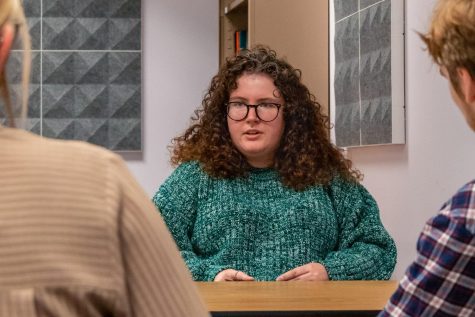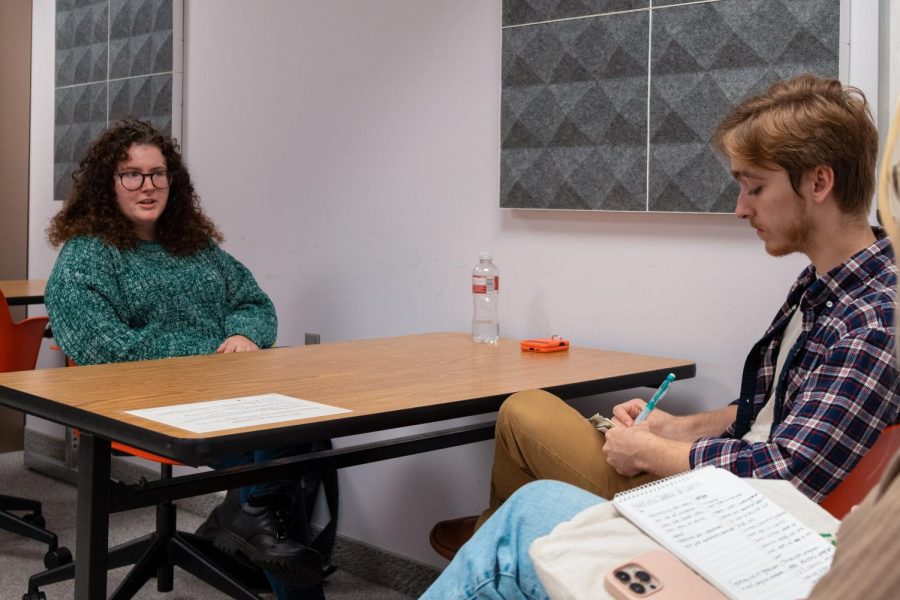English graduate programs face issues due to funding
Winona State University’s English graduate students are struggling to find assistantship positions due to decreasing availability from lower funding. These positions are often vital in graduate students’ studies and attracting new students to the program.
September 21, 2022
Winona State University’s English Graduate Program has hit a major snag with their recent reduction in assistantship positions. These positions are often vital to a graduate student’s studies and to attract new graduate students to the program, Elizabeth Zold, the graduate studies director in English, said.
Graduate assistantship positions come in three major categories; teaching, research and staff assignments. These paid positions provide graduate students with experience that can help lead to careers. Assistantship positions are available to graduate students in many different programs, but the total number of available positions have been decreasing. Currently, there are 17.5 assistantship positions, down from 25 in 2018.
The English department’s two primary master programs are in Literature and Language and Teaching English to Speakers of Other Languages (TESOL). Zold commented that these programs, TESOL especially, are teaching focused and that getting the hands-on experience of an assistantship is integral to these programs.
“So we have had a really good track record in terms of getting people placed. I think part of that is having those assistantships where they are able to not just take classes in teaching, but then put that into practice in the classroom,” Zold said.
Currently, the English department’s graduate program offers one and a half assistantship positions. This number is down from the five to eight positions of previous years. The English graduate program requested five assistantship positions. Zold commented that despite these positions being ranked highly by the graduate committee, the English graduate program ultimately received only one and a half assistantships.
Decision-making on where the limited assistantships are allocated is a complicated process that goes through multiple committees and groups. Although Jeanne Gangeness, dean for the school of graduate studies, did not comment on the specific reason or reasons for the English graduate program’s reduction in assistantship positions, she explained what goes into making this sort of decision.
First, the graduate committee presents assistantship recommendations to Gangeness to consider. Next, the recommendations are reviewed by administration who consider student enrollment in programs and students served across campus. Finally, the Deans Council and President’s Cabinet vet the recommendations prior to announcing allocation.
Zold admitted how the lack of assistantship positions have put the English graduate program in a “tough spot.”
“We had several students who applied who, because we had no assistantships to offer and were way late, ended up going elsewhere,” Zold said. “and that is the reality. A number of really good students that we just could not keep or retain, and I don’t blame them for that.”
Moreover, the lack of assistantship positions have larger impacts on campus than just the English graduate program. Zold commented how the lack of assistantships means fewer graduate students can teach English 111 courses, the English department’s most popular class. This puts more strain on the professors in the department to pick up the slack and teach extra classes.
According to Gangeness, the reason for the overall reduction in assistantship positions is due to funding.
“Winona State has experienced reduced undergraduate enrollment and challenging state funding which has resulted in across the university budget reductions,” Gangeness said. “These budget reductions have negatively impacted graduate studies funded graduate assistantships.
Zold echoed Gangeness’ sentiment about problems stemming from a lack of funding.
“All over higher education, budgets are getting slashed. For the simple reason students are deciding to go to college later, if at all. College is so costly students do not want to take on that debt. So then you have a lower enrollment, which means lower–So it is just a cycle that keeps going,” Zold said.
The English graduate program’s reduced assistantships also affects the Writing Center. With fewer assistantship positions this means fewer graduate students to tutor in the Writer Center. This means less availability for graduate level tutoring for graduate students in other master’s and doctoral programs such as nursing or teaching.

Jena Archer, an English graduate student in the Literature and Language Master of Arts program, works a halftime assistantship in the Writing Center. Archer commented that the start of this semester was the busiest start to a semester the Writing Center has seen in the last two semesters.
“Any sort of major can write a paper and do writing projects. We get a lot of students from other majors,” Archer said, “We do get like English 111 students a lot, but nursing, I see a lot of nursing papers, I see a lot of political science papers, and it is not just papers we work with.”
Archer went on to comment that at the Writing Center, they help students with a variety of written work beyond papers and essays. They also help with personal statements, resumés, applications and more.
“All of our assistantships are, of what I think of as, service to the university. So it is not just for English, it is for literally serving the entire university,” Zold said.
The reduction in assistantship positions is just another example of funding issues at Winona State. Other examples include the journalism programs’ cancellation, various professors being given early retirement deals and understaffing around campus. But these higher education funding issues are not unique to Winona State.
“It is much much bigger than just WSU though, in terms of funding, but this is kind of a microcosm of the issues of funding in higher ed right now,” Zold commented.




































